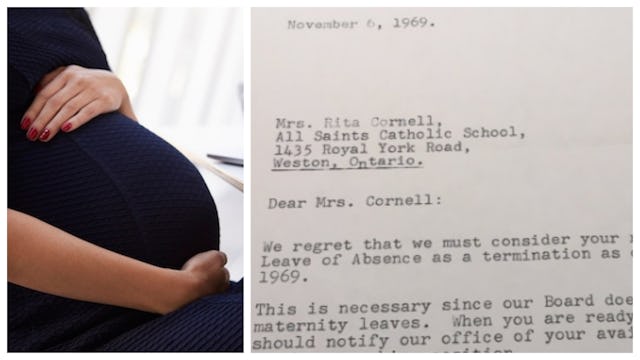Viral Note Shows How Pregnant Women Were Treated Before Maternity Leave Existed

Even in 2018, being a pregnant employee is far from ideal
Before maternity leave existed, working women who became pregnant were subject to all kinds of ill-treatment and were often fired just for being pregnant. One daughter recently shared a letter her mother received from the board of education at the school where she was employed back in the 1960s — and it’s pretty awful.
Twitter user Michaela Cornell shared her mother’s letter denying her request for a leave of absence from teaching in 1969, and people everywhere are talking about it. “My mom kept this,” she writes. “Perhaps as proof of the bullshit women had to put up with. ‘You’re pregnant? You’re fired.'”
The letter reads in full:
“Dear Mrs. Cornell,
We regret to inform you that we must consider your request for a Leave of Absence as a termination as of December 31st, 1969.
This is necessary since our Board does not yet approve maternity leaves. When you are ready to return, you should notify our office of your availability for another teaching position.
May we at this time thank you for your services as a member of our staff.”
Maternity leave didn’t exist as a fully functional, legal plan for working mothers until 1971 in Canada (where Mrs. Cornell is from) and — please, brace yourselves — 1993 in the United States, when FMLA leave was officially passed. Historically speaking, women and mothers have always been treated as disposable employees for simply being women and mothers.
In 1972, the Equal Employment Opportunity Commission drafted guidelines that required employers to treat disabilities resulting from pregnancy, such as miscarriage, abortion, or childbirth and recovery, in the same manner as other temporary disabilities. The Pregnancy Discrimination Act of 1978 prohibited discrimination on the basis of pregnancy, childbirth, or related medical conditions. Neither of these laws, however, provided any time off to recover and care for a new child. Because patriarchy.
Women everywhere quickly weighed in on Mrs. Cornell’s letter, with some sharing their own similar stories.
While there are certainly far more protections in place for working women who become pregnant these days, it would be naive to claim there aren’t still issues that need to be addressed. Family leave policies in the United States are abhorrently brief and limiting, for one thing. And many of these laws don’t actually stop companies from treating pregnant women differently or even terminating them to this day.
At the very least, it’s a stark reminder of just how disposable pregnant workers used to be. At best, it’s also a reminder that while we’ve come a long way in terms of maternity leave — boy, do we still have a long way to go.
This article was originally published on